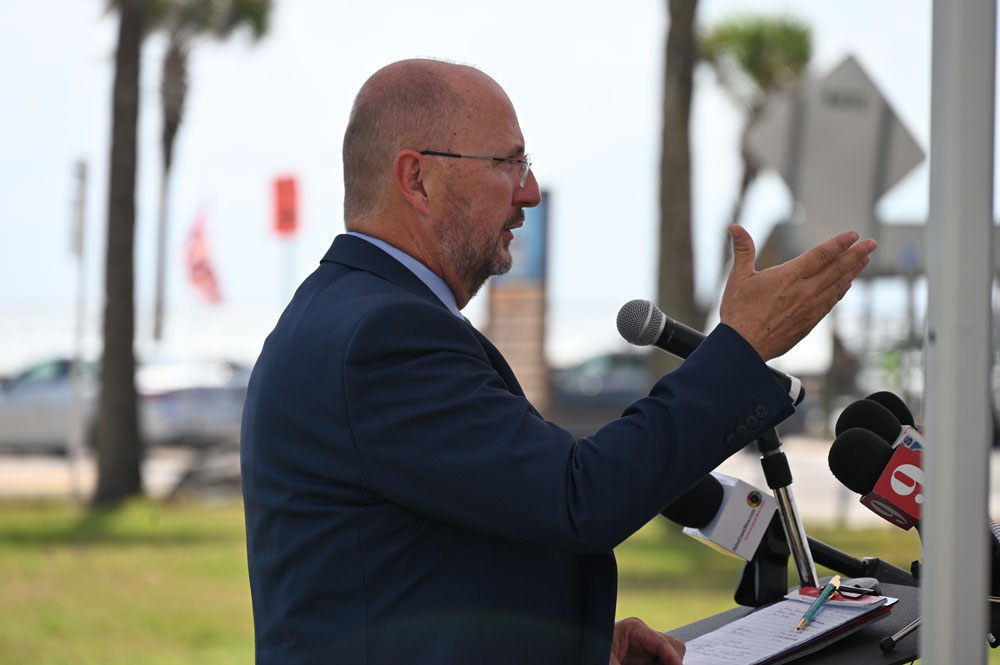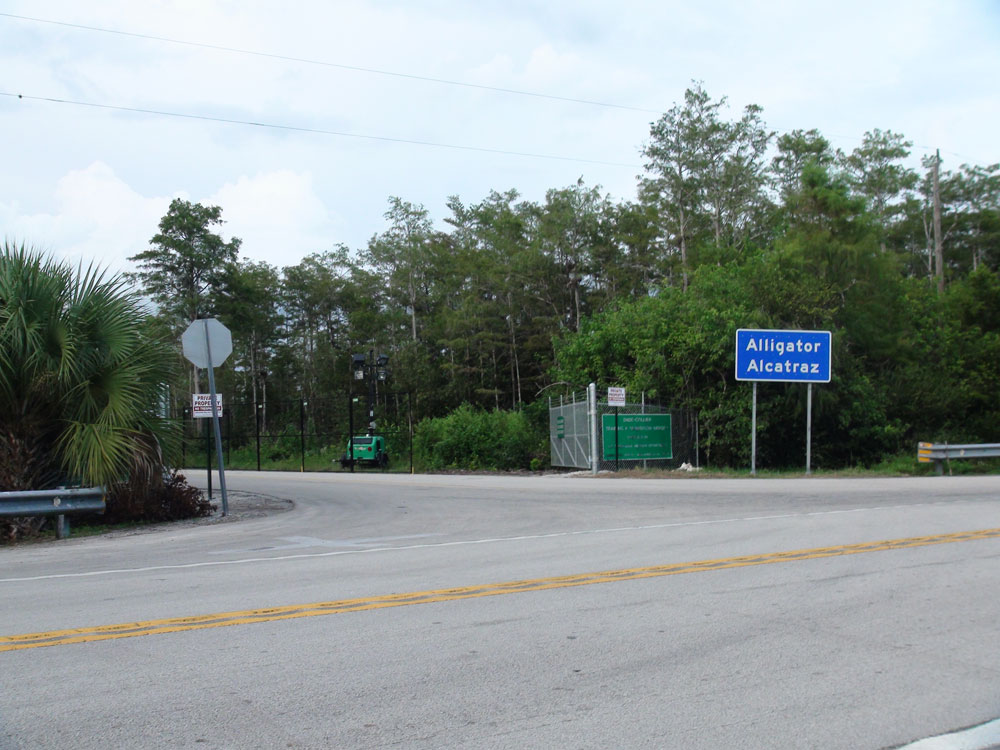In the midst of legal disputes surrounding a contentious immigrant-detention facility in the Everglades, Governor Ron DeSantis announced on Thursday that the state intends to increase the number of individuals targeted for deportation by using a closed jail in North Florida.
According to DeSantis, a plan to lodge undocumented detainees at Camp Blanding, west of Jacksonville, will be abandoned in favor of converting Baker Correctional Institution, which state corrections officials put on hold four years ago due to staffing shortages, into a second detention facility in Florida.
According to state Division of Emergency Management Director Kevin Guthrie, the cost to open the Baker County prison will be about $6 million, while a detention center at Camp Blanding, a Florida National Guard training facility, would cost between $75 million and $100 million.
Guthrie added that as part of the state’s assistance for President Donald Trump’s mass deportation efforts, the federal government has promised to provide his agency with $608 million to house 5,000 undocumented immigrants.
Alligator Alcatraz, a contentious immigration prison facility in the Everglades, was projected to cost about $450 million to build and run for a year. The rapidly constructed detention facility, which is next to the Dade-Collier Training and Transition Airport, started hosting detainees about six weeks ago.
During a news conference held at Baker Correctional Institution on Thursday, DeSantis informed reporters that the jail, known by state officials as Deportation Depot, is close to an airport in Lake City that can handle aircraft larger than the airstrip at Camp Blanding.
The Baker facility will be staffed by private contractors and National Guard soldiers, according to DeSantis.
Although we’ve discussed Camp Blanding a lot and I believe it was a good alternative, this is simply superior and ready-made. The state inmates do not now use this section of the facility. Simply said, it allows us to enter, quickly and affordably stand it up, and eventually have something that can accommodate 1,300 people. DeSantis stated that there might be more than that and that we wouldn’t think twice about adding extra beds if necessary.
Since the majority of those being held are not criminals and are being held for minor violations and misdemeanors, Hector Diaz, managing partner of the Miami-based Your Immigration Attorney business, said the converted prison appears to be overkill.
In an email, Diaz stated that it is inappropriate to place these individuals in a correctional facility that was formerly a state prison.
Diaz claimed that DeSantis and other state politicians are causing more chaos in the immigration system and causing more harm than good.
DeSantis’ announcement of the prison coincided with two ongoing federal court battles and at least a temporary delay to further building at the Everglades location.
On August 7, U.S. District Judge Kathleen Williams temporarily barred state representatives from paving, installing new lights, or carrying out any other infrastructure or building at the remote facility.
Williams’ decision was made in a lawsuit brought by the Center for Biological Diversity and Friends of the Everglades, which claimed that federal and state officials had violated a federal law requiring an environmental impact study prior to the start of construction on the detention facility, which is encircled by the Big Cypress National Preserve. The plaintiffs were joined in the case by the Miccosukee Tribe of Indians of Florida.
This week, the plaintiffs’ request for a longer-lasting preliminary injunction demanding the impact analysis was considered. Williams had previously ordered a 14-day interim injunction preventing the facility’s development. Williams stated that she intends to make a decision regarding the request prior to the temporary injunction’s expiration on August 21.
At first, state officials stated that the Everglades center could accommodate up to 3,000 inmates and could be enlarged to accommodate an additional 1,000. Guthrie stated on Thursday that the facility can house 1,000 inmates and can accommodate 2,000.
On Thursday, U.S. District Judge Rodolfo Ruiz met with lawyers in a different case brought by immigration attorneys who claim that detainees at the South Florida detention facility lack proper access to immigration courts and legal aid. Additionally, the lawyers claim that inmates are unable to have private meetings with their counsel.
State authorities stated in court records that they have made progress in creating a procedure that allows inmates to speak with their attorneys in person or via video conference, and they blamed the delay on how quickly the Everglades facility was put up.
But according to the immigration lawyers, the procedure is still insufficient, challenging to use, and does not provide the privacy that the law demands. Vilerka Solange Bilbao, for instance, has had difficulty getting approved documents that would permit her to meet with customers, according to a declaration submitted on Wednesday. Yuniel Michell Figueredo Corrales, a client who has been detained at the Everglades prison since July 11, finally had a video chat with the attorney. However, the affidavit stated that the online conference was obviously not confidential because Mr. Figueredo Corrales was sitting in a makeshift tent-like structure with no roof and soft-sided fabric walls, while guards were nearby.
Ruiz is being asked to move the case, which was filed in the federal Southern District of Florida, to the Middle District of Florida, which covers Collier County, by attorneys for state and federal officials. The airfield is in Miami-Dade County, which is in the Southern District, but the rest of the correctional facility is in Collier County.
Before resolving the plaintiffs’ request for a preliminary injunction, Ruiz will hold a hearing on Monday to discuss the court venue issue, which he seemed to be struggling with on Thursday.
There is a good chance that some of the claimed offenses should have been filed in the Middle jurisdiction of Florida rather than this jurisdiction. Additionally, some counts might actually belong in the Southern District of Florida. “I’m having trouble deciding whether or not we’ve met the threshold for injunctive relief because of these issues,” Ruiz remarked.
Ruiz brought up the prospect of dividing the case between the two court districts.
“Judicial economy serves that a judge who spent this much time going through this record should hold on to this case,” Ruiz said, suggesting that the court may be harboring a mistaken hope. As I mentioned, there might be issues with continuing this case here, and they are beginning to make sense to me.
Dara Kam, Florida News Service







